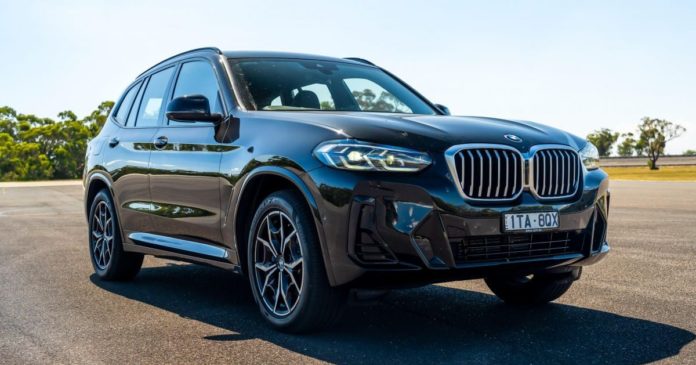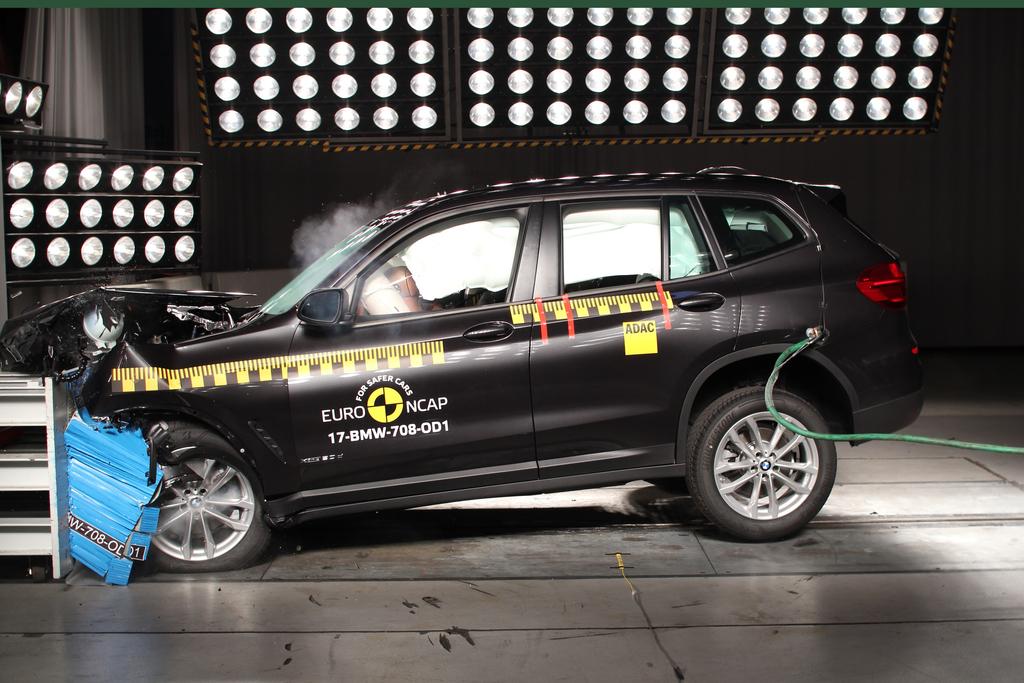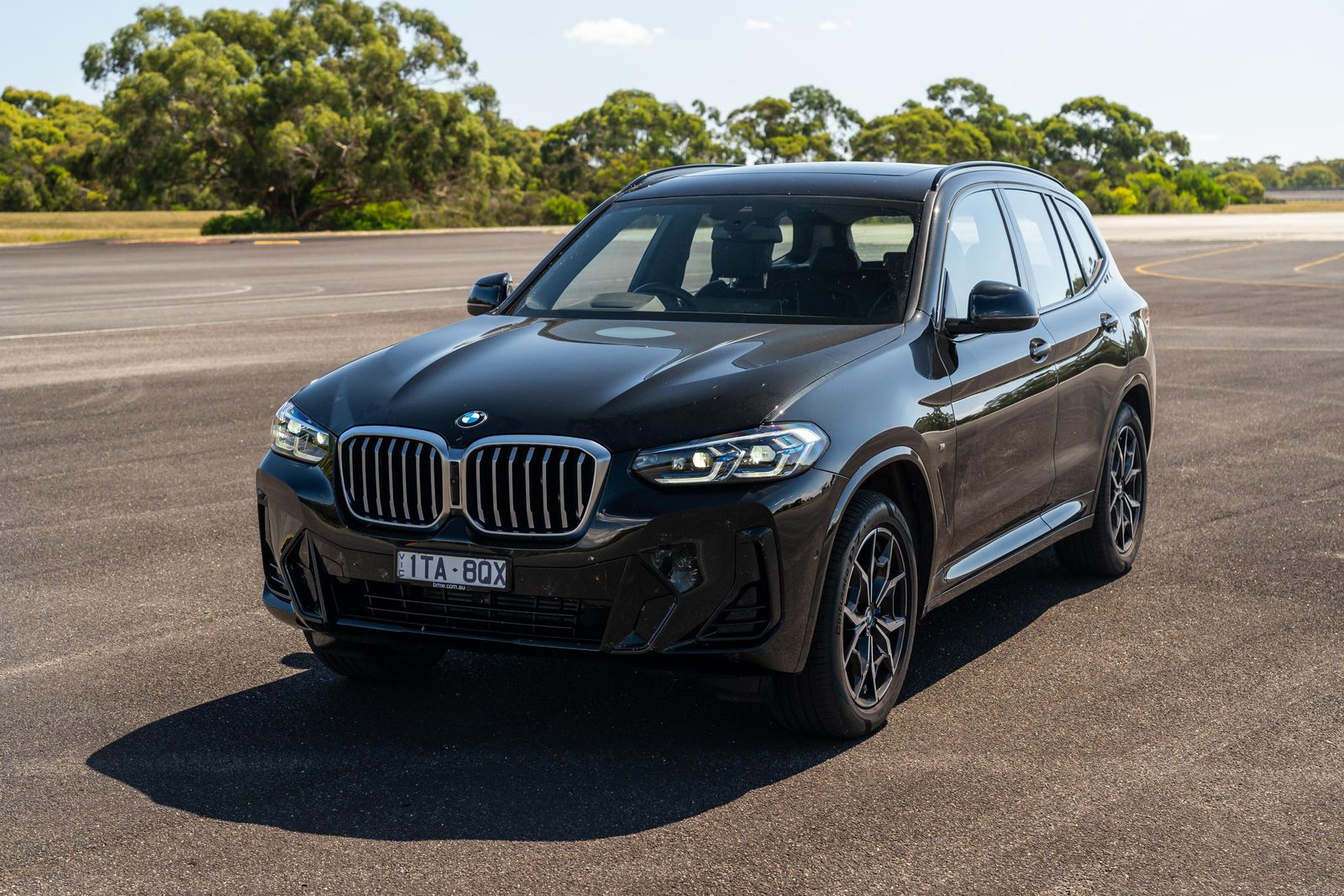The BMW X3 is one of the top-selling vehicles in the mid-sized luxury SUV segment, and we suspect it’s not just the blue-and-white roundel on the bonnet that keeps it on the podium.
Credit must be given to BMW for offering the widest array of powertrain choices of any vehicle in this segment. There are four- and six-cylinder petrol and diesel engines, plus a plug-in hybrid (PHEV) and a full-electric version, the iX3.
That compares favourably with the Mercedes-Benz GLC (soon to be petrol only locally), Audi Q5 (petrol, diesel, PHEV), Genesis GV70 (petrol, diesel, electric), Lexus NX (petrol, hybrid, PHEV) and Volvo XC60 (petrol, PHEV).
Six-cylinder turbo-diesels are particularly rare in this segment nowadays, so we’ve put the X3 xDrive30d and its inline-six oiler to the test.
BMW gave the X3 a facelift for 2022, with freshened styling and upgraded infotainment.
But this segment doesn’t stay still, and a new generation of the X3’s arch-rival from Mercedes-Benz is launching this year. A new Q5 is also expected in 2024, and the GV70 and NX are still quite fresh.
Does the X3 still hold up?
How much does the BMW X3 xDrive30d cost?
The BMW X3 xDrive30d M Sport is priced from $102,900 before on-road costs.
That puts it essentially smack-bang in the middle of a model range that opens at $81,700 before on-road costs for the rear-wheel drive, petrol four-cylinder sDrive20i. It also undercuts the plug-in hybrid xDrive30e by $7500.
The M Sport package is mandatory, though fortunately you can still get an xDrive30d M Sport with an interior colour other than black (“Oyster”, aka a pale beige).
Audi has deleted its V6 50 TDI for 2023, though the sportier SQ5 TDI and its turbo-diesel V6 beckons for around $10,000 more and an inline-six turbo-diesel Range Rover Velar Dynamic SE D300 is another $10,000 above that.
Otherwise, there are no direct rivals for the X3 with a six-cylinder diesel, though you can find more affordable four-cylinder turbo-diesels in the Genesis GV70 and Audi Q5 ranges, as well as within the X3 range itself.
You could also look at the larger Volkswagen Touareg, which has a choice of turbo-diesel sixes that bookend the X3’s in terms of power and a base price that undercuts it by over $10,000.
The upcoming Mazda CX-60 may lack a luxury nameplate, but the brand is positioning it as a more premium SUV than the likes of the CX-5 and an inline-six turbo-diesel is among its available powertrains.
It’s worth noting our tester was from when BMW Australia was importing X3s with features missing due to the semiconductor chip shortage. Accordingly, our tester didn’t have a wireless phone charger or adaptive cruise control.
What is the BMW X3 xDrive30d like on the inside?
When it comes to interior design, BMW is all about subtle evolution while arch-rival Mercedes-Benz seemingly throws the baby out with the bath water with every generation.
If you love BMW’s classic, driver-oriented dashboard design, then, the X3 will appeal to you. If you want something flashier and more high-tech in appearance, you’d be best waiting for the next-generation GLC.
The X3 is showing its age in some respects. The roller door at the base of the centre stack looks cheap and plasticky, while the X3 logo down there is an unusually gauche touch in an otherwise elegant interior.
The paddle shifters could be more tactile, too, while the doors didn’t close with quite as solid a thunk as I expected – mind you, they weren’t tinny, as this is a BMW after all.
Material quality is otherwise quite good. There’s still some hard plastic at the lower reaches of the dashboard and doors, but almost everywhere else is finished in soft-touch trim. BMW resisted the temptation to go overboard with gloss black trim, though you’ll still find sections of the stuff.
The X3 has yet to get the BMW Curved Display being rolled out across the brand’s line-up, which positions the infotainment touchscreen and digital instrument cluster in one wraparound assembly.
It also doesn’t feature BMW Operating System 8 yet – it’s still running on OS7.0 – so there’s plenty of physical switchgear. The row of preset buttons seems almost quaint now.
The infotainment interface therefore doesn’t look the newest and freshest, but it’s still easy to navigate and responsive. As always, we appreciate the additional presence of the iDrive controller and its adjacent shortcut buttons, allowing you to perform key functions without using the touchscreen or voice prompts.
The wireless smartphone mirroring worked well, with dropouts occurring only twice and in the same place, leading us to believe it was an issue with interference. But the wireless mirroring does drain your phone’s battery, so we’re glad to see a wireless phone charger back on the equipment list.
The digital instrument cluster is modern in appearance and there is a map view available, although it’s not as detailed as in Audi’s virtual cockpit. The head-up display is also customisable, and presents key information clearly and in your line of sight.
There’s BMW’s trademark orange-backlit switchgear, while the colour-adjustable ambient lighting is elegant, if not quite as extravagant as that in a Mercedes-Benz.
We have no complaints about BMW’s ambient lighting, however, particularly the illuminated exterior door handles, the safe exit lighting, and striking puddle lights.
You grip an almost inordinately large, thick steering wheel and sit in comfortable seats with power-adjustable bolsters and lumbar plus a manual thigh extender.
In the rear, the bench is firm but comfortable, and there’s plenty of legroom and knee room, though the driveline hump does eat into the centre-seat occupant’s space.
While the expansive panoramic sunroof stretches back to the rear seatbacks, headroom is ample.
Rear-seat occupants have separate temperature and fan speed controls, as well as two USB-C outlets and a fold-down centre armrest with cupholders.
There are ISOFIX points on the outboard rear seats, along with three top-tether points. The rear bench splits 40/20/40 and folds almost completely flat.
The boot measures in at 550L with all five seats in place, and expands to 1600L with the rear seats folded.
There’s a wide opening and a flat, well-shaped load space, which includes netted pockets on the sides.
What’s under the bonnet?
The X3 xDrive30d is powered by a 3.0-litre inline-six turbo-diesel producing 195kW of power at 4000rpm and 620Nm of torque from 2000-2500rpm.
It’s mated with an eight-speed torque-converter automatic transmission and all-wheel drive.
BMW claims a 0-100km/h time of 5.8 seconds, and combined cycle fuel economy of 6.4L/100km. Over a mix of inner-city, suburban and highway driving, we averaged 7.3L/100km.
The X3 xDrive30d is down 56kW and 80Nm on the Audi SQ5 TDI, but is up 10kW and a whopping 270Nm on the petrol-powered xDrive30i. It’s also quicker and torquier than the plug-in hybrid xDrive30e, which has total system outputs of 215kW and 420Nm.
How does the BMW X3 xDrive30d drive?
BMW’s 3.0-litre turbo-diesel inline six is an impressive unit in the larger, heavier X5, so naturally it doesn’t disappoint in the X3.
The X3 xDrive30d simply pulls, and proves an effortless, grunty engine. There’s a surge of torque low in the rev range and you’ll quickly find yourself at highway speeds.
Diesel clatter is virtually non-existent and there’s a meaty engine note that makes this one of the better-sounding oilers on the market.
Refinement levels are also high: at highway speeds the cabin is serene, while there’s little in the way of tyre roar on coarse-chip roads, and the automatic stop/start system never feels too jerky.
Only a slight rattle from the A-pillar on some unsurfaced roads undermined the X3’s high level of refinement.
It’s an effortless cruiser, and the X3 feels like it would be ideal for a long-distance road trip – especially with adaptive cruise control, now that that’s back.
While our tester was missing the feature, it did have other active safety and driver assist features like lane-keep assist and autonomous emergency braking, and BMW allows you to adjust the sensitivity of these instead of just toggling them on and off.
It also had BMW’s Caring Car functionality, with different modes playing specific music, changing the ambient lighting and blowing air out of the vents in a specific way to either relax or energise you. It seems a bit gimmicky, but we appreciate the energising mode for trying to address the serious issue of driver fatigue.
The 19-inch alloy wheels may have helped, but we found ride quality to be hard to fault even over unsurfaced roads.
You can make it a little firmer in Sport mode, which makes it feel a little bit busy; this mode also quickens shifts but holds onto gears for longer.
Even in Comfort mode, body control is excellent. The X3’s centre of gravity feels surprisingly low for an SUV, and it remains flat in corners. Braking performance is also exemplary, with the brakes offering plenty of bite as we discovered when a small animal ran out across the road in front of us – good news; it survived!
The LaserLight headlights are also good at helping you avoid wildlife, casting their beams far and wide. They’re not necessarily any more impressive or bright than the Matrix LED headlights of some rivals, but they offer similar functionality including the ability to block out oncoming vehicles so as to avoid blinding their drivers.
What do you get?
X3 sDrive20i + xDrive20d highlights:
- 19-inch alloy wheels
- Run-flat tyres
- Aluminium roof rails
- Adaptive LED headlights
- LED tail lights
- Rain-sensing wipers
- Power-folding side mirrors
- Heated
- Anti-dazzle (driver’s side only)
- Auto-dipping (passenger’s side only)
- Power tailgate
- 12.3-inch digital instrument cluster
- 12.3-inch touchscreen infotainment system
- Wireless Apple CarPlay, Android Auto
- Satellite navigation
- DAB+ digital radio
- 6-speaker sound system
- Wireless phone charger
- 3yr ConnectedDrive Services subscription
- Tri-zone climate control
- Ambient lighting
- Electric parking brake
- Keyless entry and push-button start
- Sport leather-wrapped steering wheel
- Black ‘Sensatec’ leatherette upholstery
- Power-adjustable front sport seats with driver memory
X3 xDrive30i M Sport + xDrive30d M Sport add:
- 20-inch alloy wheels
- M Aerodynamics package
- BMW M high-gloss black window highlights
- BMW M high-gloss black roof rails
- M Sport brakes
- 12-speaker sound system
- M leather-wrapped steering wheel
- Anthracite headliner
- M interior trim
- M door sill trims
- ‘Vernasca’ leather upholstery
- Driver’s seat bolster adjustment
Our tester had 19-inch alloy wheels fitted, a no-cost option.
BMW loves an options package, and our tester had two of these fitted: the $5400 Visibility package, which adds metallic paint, a panoramic sunroof, and BMW Laserlight headlights; and the $1200 Comfort package which brings heated front seats, driver lumbar support and a heated steering wheel.
The German brand could stand to be more generous with standard equipment. While it’s not as spartan as the lesser xDrive20d, which is lacking much of this variant’s standard safety equipment, the xDrive30d still misses out on features that are standard fit in less expensive Genesis GV70 and Lexus NX models like ventilated front seats.
Is the BMW X3 xDrive30d safe?
The pre-facelift BMW X3 managed a five-star ANCAP safety rating based on tests conducted by Euro NCAP in 2017.
It received scores of 93 per cent for adult occupant protection, 84 per cent for child occupant protection, 70 per cent for vulnerable road user protection, and 58 per cent for safety assist.
This five-star ANCAP rating applies to all variants except the xDrive30e plug-in hybrid.
Standard safety equipment includes:
- Autonomous emergency braking (AEB)
- Lane departure warning
- Lane change warning
- Cruise control
- Reversing camera
- Reverse parking sensors
- Reversing assistant
X3 xDrive30i + xDrive30d add:
- Adaptive cruise control with stop/go
- Front cross-traffic alert
- Rear cross-traffic alert
- Lane-keep assist
- Steering & Lane Control Assistant
- Blind-spot monitoring
- Junction assist
- Surround-view cameras
How much does the BMW X3 xDrive30d cost to run?
As of October 1 2022, all new BMW vehicles are covered by a five-year, unlimited-kilometre warranty. Owners also receive complimentary 24/7 roadside assistance for three years.
In terms of logbook servicing, BMW Australia offers Service Inclusive pre-paid packages that cover the first five years or 80,000km – whichever comes first.
The standard Service Inclusive Basic package costs $2400 for the core X3 range, more expensive than in an Audi Q5 or SQ5 ($3140-3170).
CarExpert’s Take on the BMW X3 xDrive30d
The X3 may not look as fresh inside and out as other vehicles inside BMW showrooms, but there’s still a lot to recommend it for.
Chief on the list of the X3’s strengths is the superb inline-six turbo-diesel engine. It’s quick, fuel-efficient, and doesn’t sound half-bad to boot.
Precious few similarly sized SUVs can offer a six-cylinder diesel, and while such an engine may seem passé in the era of electrification, we reckon there are plenty of buyers out there who’ll appreciate its attributes.
The X3 is also one of the more engaging SUVs in this segment to drive, while also offering a comfortable ride. We could easily see ourselves setting off on a cross-country road trip in one of these, with passengers able to relax in the spacious and comfortable cabin.
It mightn’t have BMW’s latest-generation infotainment, but BMW Operating System 7.0 is still an intuitive and neatly presented system.
And though the X3’s interior isn’t the flashiest in its segment, its presented in that classic – dare we say timeless? – BMW style.
Is it the most affordable or well-equipped vehicle in its segment? No, but it’s a damn good one.
Click the images for the full gallery
MORE: Everything BMW X3






















